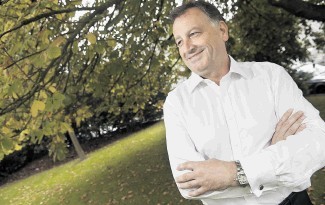
When Bob Rooney put together a business plan for his employer, he could not have known that it would lead to his dismissal.
Even more unlikely was that he and business partner Peter Scholes would take over the same company, Vikoma, five years later.
The oil-pollution control firm is now a key part of the Energy Environmental Group (EEG) stable, which Mr Rooney and Mr Scholes set up in 2003 and has since flourished.
It now employs 80 people and turns over £14million annually.
The other established firm in EEG’s portfolio is manufacturing company Screw Conveyor, but Mr Rooney said much of his focus was now on developing two young businesses, Rotawave Oil and Gas and Rotawave Biocoal.
Rotawave Biocoal turns waste wood into a replacement for coal, using microwaves to dry the material and turn it into pellets which can be used in coal-fired power stations, while the oil and gas business will use the same technology to extract water and petroleum products from drill cuttings for environmentally friendly removal.
| Bob Rooney: Q & A |
|---|
|
Who helped you get where you are today?My partnership with Peter Scholes has been the single biggest influence on my business life in recent years.
What is your greatest business challenge today? Rapid, sustainable growth needs driven, talented people. We are growing our own to a degree, but anticipate issues with skills as we expand further.
What do you still hope to achieve in business? I would like to see speedy worldwide acceptance of our biomass processing technology to vindicate the efforts of our talented and committed team, and to help in the reduction of CO2 and greenhouse-gas emissions worldwide.
If you were in power in government, what would you change? Apart from the coalition? I would provide more capital allowances for research and development. We have great brains in this country, but exploitation of a new technology is genuinely hard, frustrating work.
Where is your favourite place to go on holiday? St-Jean-Cap-Ferrat in the south of France.
Do you have any spare time and, if so, what do you do? Play the guitar.
What are you reading, listening to or glued to on TV? I am re-reading all the novels and collections of short stories by William Boyd in the order they were published, including Any Human Heart; the best novel I have read in two decades.
If you were a character in a TV series or movie, who would you be? Logan Mountstuart, the main character of Any Human Heart, who did great things and not-so-great things but still lived a full and worthwhile (if fictional) life.
What would your children (or partner) say about you? Generous, kind and faintly ridiculous.
Which charity do you support and why? The Salvation Army; they provide practical help for the disadvantaged in our communities.
What’s on your bucket list: the things you still want to accomplish? After writing a book and becoming Scotland’s leading pastry chef, I intend spending my dotage fishing on the Dee
|
Mr Rooney said: “If Screw Conveyor and Vikoma were our only companies we would be happy – and I would be able to spend more time working on my golf handicap – but with these other companies we are looking at the technology which will provide energy in the future.”
He described Rotawave Biocoal as a pre-revenue company, but after three years and £3million of research and development it recently agreed a £12.7million-plus deal with US-based investment group Cate Street Capital to pave the way for the manufacture and marketing of its product in North America. Mr Rooney is just as enthusiastic about the alternative-energy market as he is oil and gas, but his career did not start in the sector.
The coal-miner’s son was born in Bo’ness and started as a commercial apprentice at Bathgate with British Leyland before joining Shell in Aberdeen in 1978.
He later worked for energy service firm Koomey – becoming managing director aged 28 – eventually leaving to join Vikoma.
While he was sales director at Vikoma, Mr Rooney and Mr Scholes submitted a business plan for the future of the business, but were both dismissed because the owner did not agree with their strategy.
After EEG was set up the pair tried unsuccessfully to buy Vikoma, but jumped at the opportunity in 2007 when it was put up for sale and wasted no time implementing the plan they had formed while working with the company first time round.
Mr Rooney, who lives in Aberdeen, said Vikoma could now take on private-equity investment to exploit its growth potential.
He said: “There are still significant global opportunities for Vikoma and we are exploring potential acquisitions and opening offices in China and North America.
“We have been approached by potential buyers and private-equity providers in the past, but we have been having too much fun building the business our way and creating our own culture both in Aberdeen and in the Isle of Wight, where our factory is.
“The growth potential and the need to grow more quickly may mean we have to rethink our approach, and I guess we would not be averse to exploring private-equity investment in the future with partners who share our confidence in the potential and are able to bring much more than just working capital.”
Mr Rooney said while Rotawave Biocoal was at a different stage to Vikoma, it was at a turning point because of increasing legislation across the world on the use of fossil fuels, adding: “The world burns 9billion tonnes of coal per year and there is pressure for 10% of that to come from alternative sources in future; that is our target market.
“I never thought when we started Rotawave Biocoal last year that we would be hitting the turnover figures we have, but we are now in a position where I think we can do more than that.”
Recommended for you
